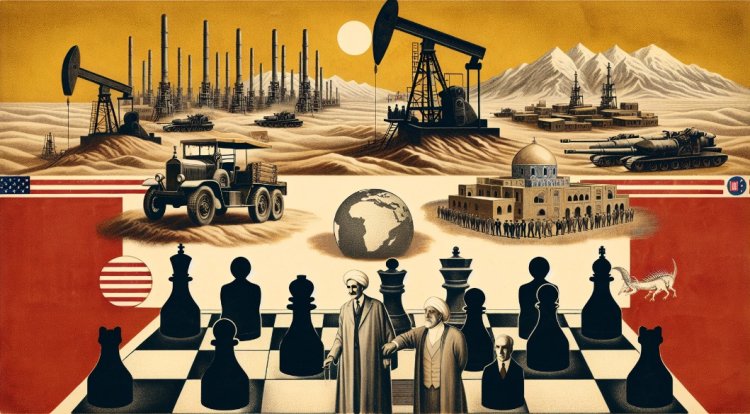The 1953 Coup in Iran: Why Iran Hates America?
Unraveling the tangled threads of history. Explore the CIA-backed 1953 coup in Iran and its enduring impact on Iranian sentiment towards America, from simmering resentment to fierce opposition.

Introduction
In the early 20th century, Iran's oil industry began with the establishment of the Anglo-Iranian Oil Company (AIOC). This company, in which the British government held a controlling share, exploited Iran's oil resources for their own benefit. The Iranian people were unhappy with this arrangement and saw it as European interference in their country's affairs.
In 1951, Mohammad Mossadegh became the Prime Minister of Iran with a vision to nationalise the oil industry and bring prosperity to the country. However, this plan was met with outrage from Western interest groups, particularly Britain and the emerging superpower, the United States. Backed by the CIA and MI6, a coup was orchestrated in 1953 to topple Mossadegh and reinstate a more compliant leader, Mohammad Reza Shah.
The 1953 coup, known as Operation Ajax, had a significant impact on American reputation in the Middle East. The revolution that followed made the United States deeply unpopular among Iranians and other Middle Eastern societies. It solidified the perception of America as untrustworthy, tyrannical, and dangerous due to its aggressive foreign policy.
Historical Context
In the early 20th century, Persia (now Iran) was caught in the competing influences of Tsarist Russia and Great Britain. The Iranian people perceived the British government's ownership of a controlling stake in Iran's oil industry, the Anglo-Iranian Oil Company (AIOC), as foreign meddling in their domestic affairs.
In 1951, Mohammad Mossadegh became the Prime Minister of Iran and sought to nationalise the oil industry, a move that was met with outrage from Western interest groups, particularly Britain and the United States. This led to the 1953 orchestrated coup known as Operation Ajax, intending to topple Mossadegh and reinstate a more compliant leader, Mohammad Reza Shah.
The grievances of Iranian nationalists against foreign interference, particularly in the form of the British oil concession, were a driving force behind their support for Mossadegh's nationalisation efforts. The oil concession became a symbol of European interference and exploitation of Iran's resources.
Following the coup, Reza Shah Pahlavi rose to power and sought to restore Iran's glory through European-style modernization. However, his authoritarian rule and perceived compliance with foreign powers led to his forced resignation in 1941, further fueling the grievances of Iranian nationalists.
Political Landscape in Iran
In the early 20th century, Iran experienced a dynamic political landscape with various ideological currents. These ideologies played a crucial role in shaping Iran's political climate during that time.
Overview of Various Political Ideologies
Iran during this period saw the emergence of different political ideologies, including:
-
Tudeh Party: A Soviet-backed leftist party that gained support through its focus on workers' rights and organising mass support.
-
Liberals: advocates for democratic governance based on the 1906 Constitution, with prominent figures like Mohammad Mossadegh leading the charge.
-
Royalists: supporters of the monarchy and its interests, often intertwined with the ruling Shah's vision.
-
Islamists: A potent ideological current that drew on the support of the Ulama and emphasised the need for Sharia-based government, particularly as represented by the Fedayeen-I Islam group.
Importance of Key Political Players
Within this political landscape, certain figures and parties held significant importance:
-
Tudeh Party: As a Soviet-backed leftist party, the Tudeh Party organised mass support through the working class, making them a powerful force in Iranian politics.
-
Liberals: Led by figures like Mohammad Mossadegh, liberals championed democratic governance and played a crucial role in advocating for the nationalization of Iran's oil industry.
-
Royalists: Supporters of the monarchy, the royalists aligned their interests with the ruling Shah's vision and sought to maintain the status quo.
-
Islamists: The Fedayeen-I Islam group, led by Ayatollah Abol-Qasim Kashani, sought to establish a governance system based on Sharia law and free from foreign influence.
The alliance between Mossadegh and Kashani
A notable alliance formed during this time was between Mohammad Mossadegh, a liberal politician, and Ayatollah Abol-Qasim Kashani, a prominent Islamist leader. Despite their ideological differences, Mossadegh and Kashani joined forces to pursue common goals, particularly advocating for more Islamist-friendly reforms and resisting foreign intervention in Iran's affairs.
Mossadegh's Rise to Power
In 1951, Mohammad Mossadegh became the Prime Minister of Iran, with a vision to nationalise the oil industry and bring prosperity to the country. His appointment marked a significant turning point in Iran's history and set the stage for the events that followed.
Mossadegh's plan to nationalise the oil industry was met with outrage from Western interest groups, particularly Britain. The Iranian people perceived the British government's ownership of a controlling stake in Iran's oil industry, the Anglo-Iranian Oil Company (AIOC), as foreign meddling in their domestic affairs.
Despite offers of a 50/50 split with the British, Mossadegh's nationalisation efforts were rejected. This rejection by the British led to the imposition of sanctions on Iranian oil, further exacerbating the economic turmoil in the country.
The consequences of British sanctions on Iranian oil were severe. Iran's economy, heavily dependent on oil revenue, suffered greatly, leading to widespread poverty and unemployment. The Iranian people felt the impact of these sanctions, and their dissatisfaction with Mossadegh's government grew.
Growing opposition to Mossadegh's government came from various groups within Iran's political landscape. Royalists, supporters of the monarchy, were aligned with the ruling Shah and sought to maintain the status quo. Ayatollah Abol-Qasim Kashani led the Islamist movement, which pushed for Sharia-based rule of law and opposed foreign intervention.
Despite these challenges and growing opposition, Mossadegh formed a notable alliance with Kashani, a prominent Islamist leader. Despite their ideological differences, they joined forces to pursue common goals, particularly advocating for more Islamist-friendly reforms and resisting foreign intervention in Iran's affairs.
In Iran's history, Mossadegh's ascent to power marked a turning point that eventually resulted in the CIA and MI6-planned coup of 1953. The nationalisation of the oil industry and the consequences of British sanctions set the stage for increasing opposition to Mossadegh's government. This opposition, combined with external interference, would ultimately shape the events that followed.
The role of the United States
Throughout the 1953 coup in Iran, the United States played a significant role in supporting British efforts to destabilise the country and reinstall a more compliant leader. With the support of the newly risen superpower, the United States, the British government worked to safeguard its interests in the area, particularly in Iran's oil sector.
Under President Dwight D. Eisenhower, the United States changed its approach towards Iran, adopting a more assertive stance. Eisenhower's administration saw the crisis through the lens of the Cold War, framing it as a victory for Communist encroachment if Mossadegh's government remained in power. This shift in perspective led the United States to actively participate in the coup.
The Central Intelligence Agency (CIA) and the British MI6 spy agency collaborated on Operation Ajax, the covert plan to remove Mossadegh from office. They worked together to create the conditions necessary for regime change, including a propaganda campaign against Mossadegh and bribing influential figures in the Iranian political scene.
Involvement of the CIA and MI6
The CIA and MI6 were instrumental in orchestrating the coup. John Foster Dulles, the American Secretary of State, and his brother Allen Dulles, the CIA chief, worked closely with Kermit Roosevelt, the CIA chief of the Near East and Africa Division. They coordinated efforts to support General Fazlollah Zahedi, who would replace Mossadegh as prime minister.
Both intelligence agencies received funding from their respective governments to carry out their plans. They launched a propaganda campaign against Mossadegh, portraying him as a threat to national security and a communist sympathiser. They also employed unconventional tactics, such as pretending to be socialists and intimidating various political groups, to incite anti-Mossadegh sentiment.
Plan to Create Conditions for Regime Change
The goal of Operation Ajax was to create the conditions necessary for Mossadegh's removal, but the actual downfall of his government would have to be carried out by the Iranians themselves. The CIA and MI6 aimed to engineer maximal confusion and chaos, using paid infiltrators to pose as Tudeh party members and incite violence and looting. They also mobilised pro-Royalist groups to repulse the apparent communist revolution.
On August 15, 1953, the Shah dismissed Mossadegh, but the initial attempt to remove him failed as thousands of Mossadegh's supporters took to the streets. However, the second phase of the plan, which involved hired infiltrators posing as pro-Royalists, succeeded in creating widespread violence and unrest. The army, under the leadership of General Zahedi, stormed government buildings and eventually arrested Mossadegh, who turned himself in to prevent further bloodshed.
The successful coup resulted in the installation of General Zahedi as prime minister and the concentration of power in the hands of Mohammad Reza Shah. The United States achieved its goal of establishing a friendly government in Iran and gaining influence in the country's profitable oil industry. However, this intervention would have long-lasting negative consequences for both the Shah and the United States, as Iranians viewed the Shah as a puppet ruler and saw America as an imperialist country seeking to exploit their resources.
The 1953 Coup and its Consequences
The 1953 coup in Iran, known as Operation Ajax, had far-reaching consequences for both Iran and the United States. This section will discuss the events leading up to the coup, the failure of the initial coup attempt, the infiltration of pro-communist and pro-royalist groups, and the rise to power of General Zahedi.
Events leading up to the coup on August 15th
In 1951, Mohammad Mossadegh became the Prime Minister of Iran with a vision to nationalise the oil industry and bring prosperity to the country. This plan was met with outrage from Western interest groups, particularly Britain and the United States. Backed by the CIA and MI6, a coup was orchestrated in 1953 to topple Mossadegh and reinstate a more compliant leader, Mohammad Reza Shah.
Failure of the initial coup attempt and the Shah's escape
The initial coup attempt on August 15th failed, as thousands of Mossadegh's supporters took to the streets. The Shah, fearing for his life, escaped to Baghdad. However, the second phase of the plan, which involved hired infiltrators posing as pro-Royalists, succeeded in creating widespread violence and unrest.
Infiltration of pro-communist and pro-royalist groups
The CIA and MI6 infiltrated pro-communist and pro-royalist groups to create chaos and confusion. Paid infiltrators posed as Tudeh party members, inciting violence and looting in the name of a communist revolution. Meanwhile, another group of infiltrators posed as pro-Royalists, mobilising scared and angry crowds to repulse the apparent revolution.
General Zahedi's rise to power and Mossadegh's arrest
General Zahedi, a staunch royalist, led the army in storming government buildings and arresting Mossadegh to prevent further bloodshed. Zahedi became the new Prime Minister, and Mossadegh was sentenced to three years of solitary confinement and then placed under house arrest until his death.
The successful coup resulted in the concentration of power in the hands of Mohammad Reza Shah and the establishment of a more compliant government. However, the coup also had long-lasting negative consequences. Iranians viewed the Shah as a puppet ruler and saw the United States as an imperialist country seeking to exploit its resources.
Short-Term Benefits and Long-Term Repercussions
The 1953 coup in Iran, known as Operation Ajax, had both short-term benefits and long-term repercussions for both the Shah and the United States. While the coup consolidated power for Mohammad Reza Shah and allowed Iran to have greater control over its oil industry, it also led to negative perceptions of the Shah as a Western puppet and damaged relations between Iran and the United States.
Consolidation of power for Mohammad Reza Shah
The successful coup resulted in the installation of General Zahedi as prime minister and the concentration of power in the hands of Mohammad Reza Shah. This allowed the Shah to rule as an autocrat for the next 25 years and implement his vision for modernization in Iran. With greater control over the government, the Shah could stabilise the country and benefit from the influx of money from the oil trade.
Iran's greater control of its oil industry
The coup also led to greater control of Iran's oil industry. The Consortium Agreement of 1954 determined that Iranians would receive 50% ownership of the oil industry, with the remaining half split between the Dutch, French, British, and Americans. The Anglo-Iranian Oil Company (AIOC) was renamed BP, which is still a major oil company today. This increased control over oil resources allowed Iran to benefit financially and have a say in its own oil industry.
The negative perception of the Shah as a Western puppet
However, the 1953 coup solidified the perception of Mohammad Reza Shah as a Western puppet. The coup was orchestrated by the CIA and MI6 to establish a more compliant leader aligned with Western interests. This perception of the Shah as a puppet ruler undermined his legitimacy among Iranians and fueled resentment towards Western powers, particularly the United States.
Damaged relations between Iran and the United States
The United States' involvement in the 1953 coup had long-lasting negative consequences for relations between Iran and the United States. Iranians viewed the coup as evidence of America's imperialist agenda and its willingness to exploit Iran's resources for its own benefit. The negative experiences with the British, combined with the 1953 coup, poisoned the prospects for fruitful relations between Iran and the United States, leading to further tensions in the future.
Legacy and Lessons Learned
The 1953 coup in Iran, known as Operation Ajax, had significant consequences and left a lasting impact on the region. It serves as a precedent for American involvement in regime change, particularly in the Middle East.
The 1953 coup as a precedent for American involvement in regime change
The successful coup in Iran established a blueprint for American intervention in other countries. It demonstrated that the United States was willing to support covert operations to remove governments that were perceived as a threat to its interests. This precedent has influenced American foreign policy in subsequent decades, shaping its approach to regime change in countries like Guatemala, Chile, and Iraq.
Impact on future revolutionary sentiment in Iran
The 1953 coup had a profound impact on the revolutionary sentiment in Iran. The overthrow of Mohammad Mossadegh's government and the subsequent installation of a pro-Western leader, Mohammad Reza Shah, fueled resentment among Iranians. This resentment eventually culminated in the 1979 Islamic Revolution, which overthrew the Shah and established an Islamic Republic.
Perception of the US as an imperialist country in the Middle East
The 1953 coup solidified the perception of the United States as an imperialist country in the Middle East. The intervention in Iran was seen as evidence of America's willingness to exploit resources and undermine the sovereignty of other nations for its own benefit. This perception of the US as an imperialist power has persisted in the region and has shaped attitudes towards American foreign policy.
Relevance of the 1953 coup to understanding US-Iran relations today
The 1953 coup continues to be relevant in understanding the complex relationship between the United States and Iran today. The coup created a deep mistrust among Iranians towards the US government, which has influenced their attitudes and policies towards America. It also serves as a reminder of the historical grievances that underpin the tensions between the two countries, particularly about issues like nuclear proliferation and regional influence.
Conclusion
In conclusion, the 1953 coup in Iran, known as Operation Ajax, had significant and long-lasting repercussions. Here is a summary of the key points discussed:
-
The CIA and MI6 planned the coup in order to remove Prime Minister Mossadegh and install Mohammad Reza Shah, a more obedient leader.
-
The coup solidified the perception of the United States as an imperialist country seeking to exploit Iran's resources.
-
The successful coup resulted in the concentration of power in the hands of the Shah and the establishment of a more compliant government.
-
Iran gained greater control over its oil industry through the Consortium Agreement of 1954.
-
The coup had long-lasting negative consequences, leading to negative perceptions of the Shah as a puppet ruler and damaging relations between Iran and the United States.
The long-lasting consequences of the 1953 coup are still felt today. It serves as a precedent for American involvement in regime change, particularly in the Middle East. The coup fueled revolutionary sentiment in Iran, ultimately leading to the 1979 Islamic Revolution. The perception of the United States as an imperialist country in the Middle East continues to shape attitudes towards American foreign policy.
Understanding historical events like the 1953 coup is crucial for shaping future policies. It highlights the need for diplomacy and trust-building in international relations. The coup serves as a reminder that actions taken by powerful nations can have far-reaching consequences and impact the lives of ordinary people.
In conclusion, the 1953 coup in Iran is a pivotal moment in history that continues to shape the geopolitical landscape of the Middle East today. It underscores the importance of learning from the past and making informed decisions to avoid repeating the mistakes of the past.



 admin
admin 










